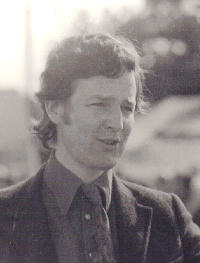
ROSC Nollaig 1972
"Times" Man on Wales and the Welsh
le P�l � Duibhir|
Trevor Fishlock is the Wales correspondent of The Times and author of the recently published book "Wales and the Welsh" which is reviewed in ROSC this month. P�l � Duibhir interviewed him recently for ROSC. ROSC: Could we start with your recent book? What precisely was your purpose in writing it? FISHLOCK: Well, its main purpose is to give a more complete and somewhat corrected picture of Wales to those outside the country whose idea of Wales is limited to what they see of the Eisteddfod on T.V., namely the Gorsedd ceremonies once a year, and the demonstrations and disruptions which make the news, particularly on the language issue. A second purpose is to preserve some of those things which are dying out and which have not been set down or adequately recorded, an example of this is the chapter on Welsh nicknames, this is a practice which is dying out and which has not been written up before. ROSC: And what about the non Welsh-speaking majority in Wales? FISHLOCK: Certainly, I hope that the book will also present Welsh-Wales to the rest of the people of Wales. ROSC: How would you describe the book? FISHLOCK: It really presents many strands of contemporary Wales without going into an awful lot of background or taking any particular stand on matters. Nonetheless, I think that my stand is obvious from a reading of the book. ROSC: As a relative outsider, how do you react to the Welsh Language Society?  FISHLOCK: I am in sympathy with a lot of what they stand for , and also with a lot of what they do. There are, however, some activities of theirs with which I don't agree. One of these is the damaging of equipment at the Manchester T.V. studios which led to Ffred Ffransis being put away for a year. The act itself was not a particularly useful one and Ffred is now out of circulation instead of carrying on activities which might be more useful to the Society. I think too that the Society is diversifying into too many issues, such as the question of holiday homes, and this tends to cloud its main front, which is really the language issue. FISHLOCK: I am in sympathy with a lot of what they stand for , and also with a lot of what they do. There are, however, some activities of theirs with which I don't agree. One of these is the damaging of equipment at the Manchester T.V. studios which led to Ffred Ffransis being put away for a year. The act itself was not a particularly useful one and Ffred is now out of circulation instead of carrying on activities which might be more useful to the Society. I think too that the Society is diversifying into too many issues, such as the question of holiday homes, and this tends to cloud its main front, which is really the language issue.ROSC: Do you not think the Society is alienating the non-Welsh-speaking majority? FISHLOCK: There has been a certain amount of alienation brought about by the campaigns, but to some extent this is inevitable. Where the Society does fall down is in not presenting its case to these non-Welsh-speaking Welsh. There is a need for a lot more explanation of what they are doing and why they are doing it. There are plenty of people who are prepared to do this inside the Welsh-speaking community and certainly this performs a valuable function of boosting morale, but there is a need for a legion of quiet persuaders to "infiltrate" the monoglot English-speaking section of the community, and to talk, talk, talk, to persuade quietly and effectively. In this way a lot of potential alienation could be forestalled. ROSC: Do you think this will be done? FISHLOCK: Only if the campaign gets the firm leadership and discipline it needs, so that people don't start doing silly things. This is very important if the campaign is to maintain its direction. ROSC: How do you see the issue being finally resolved? FISHLOCK: For one thing, I don't see the possibility of a bilingual state in Wales as this would be unacceptable to people in South Wales. I don't see any geographical division of Wales on linguistic lines either because you have more Welsh-speakers in Glamorgan than in any other county in Wales. I don't really see how the situation will evolve, but there remains the need to communicate and things must be done very quickly. The bilingual schools are most important. Attitudes generally could be improved and more rights accorded to the language. Other than that the situation appears wide open and it is not clear what may happen. ROSC: Are there any good signs for the future, as far as the language is concerned? FISHLOCK; One positive result of the Welsh Language society's campaign, as far as outsiders are concerned, has been the involvement of the older generation. These have been made conscious of their essential Welshness and they are now coming forward and supporting the campaign, particularly in the matter of not paying T.V. licences and suchlike. Of particular importance as far as people outside Wales are concerned are the large number of ministers of religion who are involved. This does give the idea to those outside that the campaign is a responsible one, and that it has some basis in society generally. This is a very positive and encouraging aspect of what is going on at the moment. |
